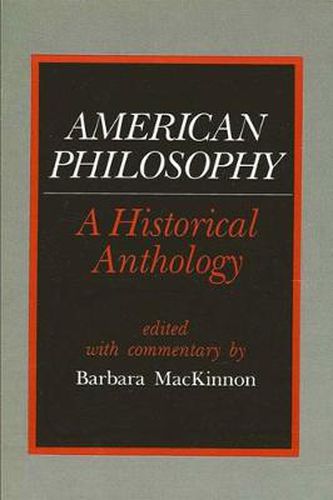Readings Newsletter
Become a Readings Member to make your shopping experience even easier.
Sign in or sign up for free!
You’re not far away from qualifying for FREE standard shipping within Australia
You’ve qualified for FREE standard shipping within Australia
The cart is loading…






This title is printed to order. This book may have been self-published. If so, we cannot guarantee the quality of the content. In the main most books will have gone through the editing process however some may not. We therefore suggest that you be aware of this before ordering this book. If in doubt check either the author or publisher’s details as we are unable to accept any returns unless they are faulty. Please contact us if you have any questions.
This anthology demonstrates the richness and diversity of the American intellectual heritage. In it we see how Jonathan Edwards grapples with the problem of how to reconcile freedom and responsibility with Calvinist religious beliefs; how Franklin and Jefferson exemplified American enlightenment thought; and how the Transcendentalists, Ralph Waldo Emerson and Henry David Thoreau, formulated their particular romantic idealist beliefs. A second and significant portion of the anthology is devoted to Pragmatism. Substantive excerpts from Peirce, James and Dewey, as well as Royce, are collected here. A third part is devoted to other Twentieth-Century American philosophies. No other collection of writings in this field includes the breadth of coverage that this one does. Among the chapters in this third part of the book are those on early Process Philosophy, Phenomenology, Positivism, and Language Philosophies. Selections from such philosophers as Whitehead, Weiss, Buchler, Gurwitsch, Sellars, Quine, Davidson, and Rawls, along with many others are included in this part. A final chapter is devoted to twentieth-century American Moral Philosophy. The book is specifically designed to be used as a text for courses in American philosophy. A substantive introduction that emphasizes the historical setting as well as major interests and ideas of the philosophers accompanies each chapter. Extensive bibliographies and study guide questions follow each chapter. The selections include more than any one course will cover, but in their completeness also allow individual teachers and readers to select what they want.
$9.00 standard shipping within Australia
FREE standard shipping within Australia for orders over $100.00
Express & International shipping calculated at checkout
This title is printed to order. This book may have been self-published. If so, we cannot guarantee the quality of the content. In the main most books will have gone through the editing process however some may not. We therefore suggest that you be aware of this before ordering this book. If in doubt check either the author or publisher’s details as we are unable to accept any returns unless they are faulty. Please contact us if you have any questions.
This anthology demonstrates the richness and diversity of the American intellectual heritage. In it we see how Jonathan Edwards grapples with the problem of how to reconcile freedom and responsibility with Calvinist religious beliefs; how Franklin and Jefferson exemplified American enlightenment thought; and how the Transcendentalists, Ralph Waldo Emerson and Henry David Thoreau, formulated their particular romantic idealist beliefs. A second and significant portion of the anthology is devoted to Pragmatism. Substantive excerpts from Peirce, James and Dewey, as well as Royce, are collected here. A third part is devoted to other Twentieth-Century American philosophies. No other collection of writings in this field includes the breadth of coverage that this one does. Among the chapters in this third part of the book are those on early Process Philosophy, Phenomenology, Positivism, and Language Philosophies. Selections from such philosophers as Whitehead, Weiss, Buchler, Gurwitsch, Sellars, Quine, Davidson, and Rawls, along with many others are included in this part. A final chapter is devoted to twentieth-century American Moral Philosophy. The book is specifically designed to be used as a text for courses in American philosophy. A substantive introduction that emphasizes the historical setting as well as major interests and ideas of the philosophers accompanies each chapter. Extensive bibliographies and study guide questions follow each chapter. The selections include more than any one course will cover, but in their completeness also allow individual teachers and readers to select what they want.